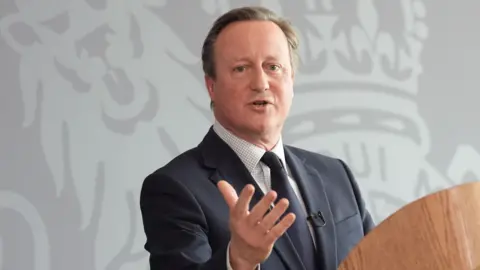 PA MediaDavid Cameron has urged the UK to consider sanctioning two Israeli ministers as a way of "putting pressure" on the country to act within international law.
PA MediaDavid Cameron has urged the UK to consider sanctioning two Israeli ministers as a way of "putting pressure" on the country to act within international law.
Speaking to the BBC's Today programme, the former Conservative foreign secretary said before the election he had been "working up" plans to put sanctions on Finance Minister Bezalel Smotrich and National Security Minister Itamar Ben-Gvir.
He described the two men as "extremist" and said using sanctions would send a message to Israeli Prime Minister Benjamin Netanyahu that "this is not good enough and has to stop".
The BBC has contacted Smotrich and Ben-Gvir for a response.
Lord Cameron said both men had "said things like encouraging people to stop aid convoys going into Gaza, they have encouraged extreme settlers in the West Bank with the appalling things they have been carrying out".
Earlier this year, Smotrich suggested it might be "justified and moral" to starve Gazans and has called for Palestinian residents to leave and make way for Israelis who could "make the desert bloom".
Asked why the planned sanctions did not go ahead, Lord Cameron, who was foreign secretary between 2023 and 2024, said he had been advised that it would have been "too much of a political act" during the election.
UK Foreign Secretary David Lammy has condemned comments by the Ben-Gvir and Smotrich as "entirely unacceptable".
Speaking at a Labour conference event last month, he said: "We are very worried about escalatory behaviour, about inflamed tensions.
"I’m absolutely clear, if we have to act, we will act. I’m in discussions with G7 partners, particularly European partners, on that. I’m not announcing further sanctions today but that is kept under close review."
Asked in Parliament about sanctioning the Be-Gvir and Smotrich, Foreign Office minister Anneliese Dodds said that the government kept its sanctions regime "closely under review" and would announce any changes.
 ReutersItamar Ben-Gvir (L) and Bezalel Smotrich (R) are part of Netanyahu's right-wing coalition in the Israeli parliamentWhitehall sources have told the BBC that Lord Cameron's plan to impose a travel ban and asset freeze on both men had been well advanced and ready to go.
ReutersItamar Ben-Gvir (L) and Bezalel Smotrich (R) are part of Netanyahu's right-wing coalition in the Israeli parliamentWhitehall sources have told the BBC that Lord Cameron's plan to impose a travel ban and asset freeze on both men had been well advanced and ready to go.
The imposition of sanctions requires a detailed and legally binding case which takes time to compile.
But they said the decision was put on hold for fear of inflaming political tensions during campaigning for the general election.
There were concerns about triggering violence in constituencies where views about the Middle East were polarised.
It is also understood the United States at the time opposed sanctioning Mr Smotrich and Ben-Gvir. The UK tends to impose sanctions alongside US and the European Union to maximise their impact.
The Foreign Office never comments on or predicts future sanctions decisions; however, some sources said any decision on sanctioning the two Israeli ministers might be delayed until after the US election.
They also said that with such little UK leverage over Israel, domestic political factors may play a bigger part in any decision.
Labour has already restricted UK arms sales to Israel, refunded the UN agency helping Palestinians, and lifted opposition to the International Criminal Court having the right to seek an arrest warrant for Netanyahu.
starsoftonline News
Seattle News Central: Discover What's Happening in the Pacific Northwest
